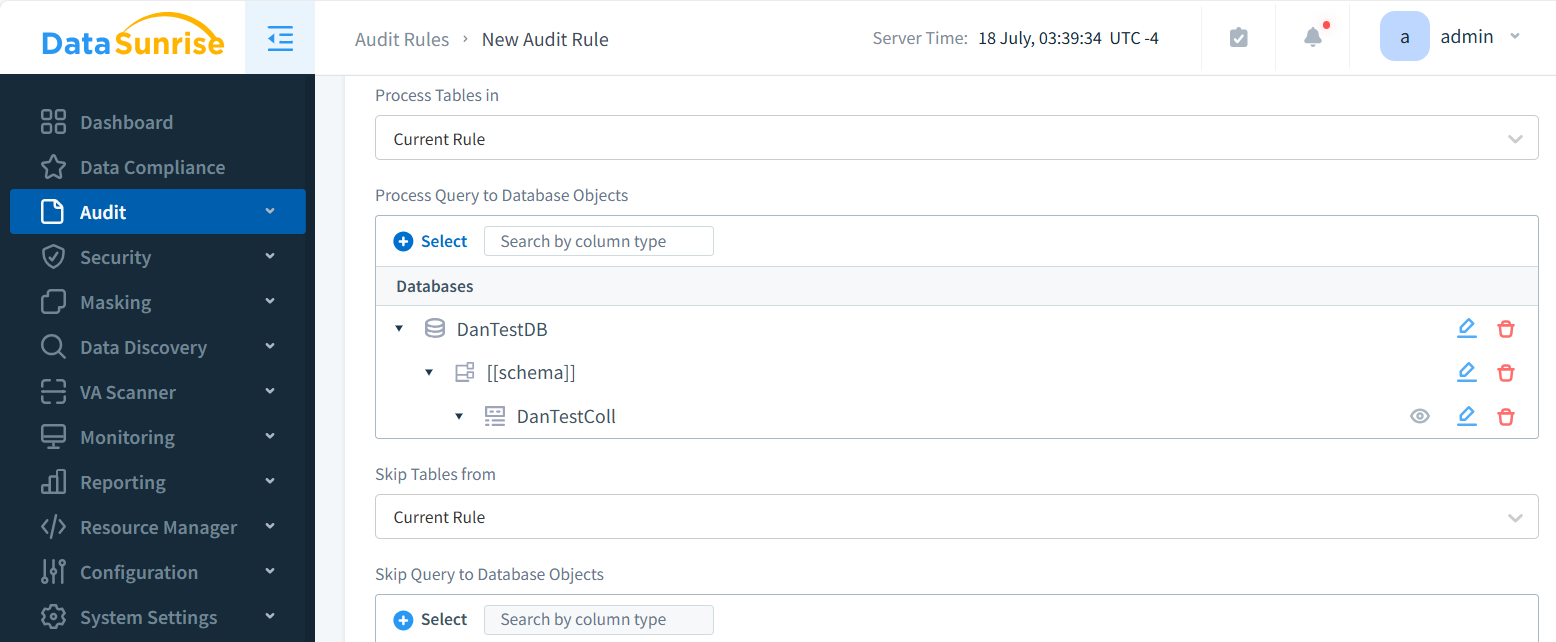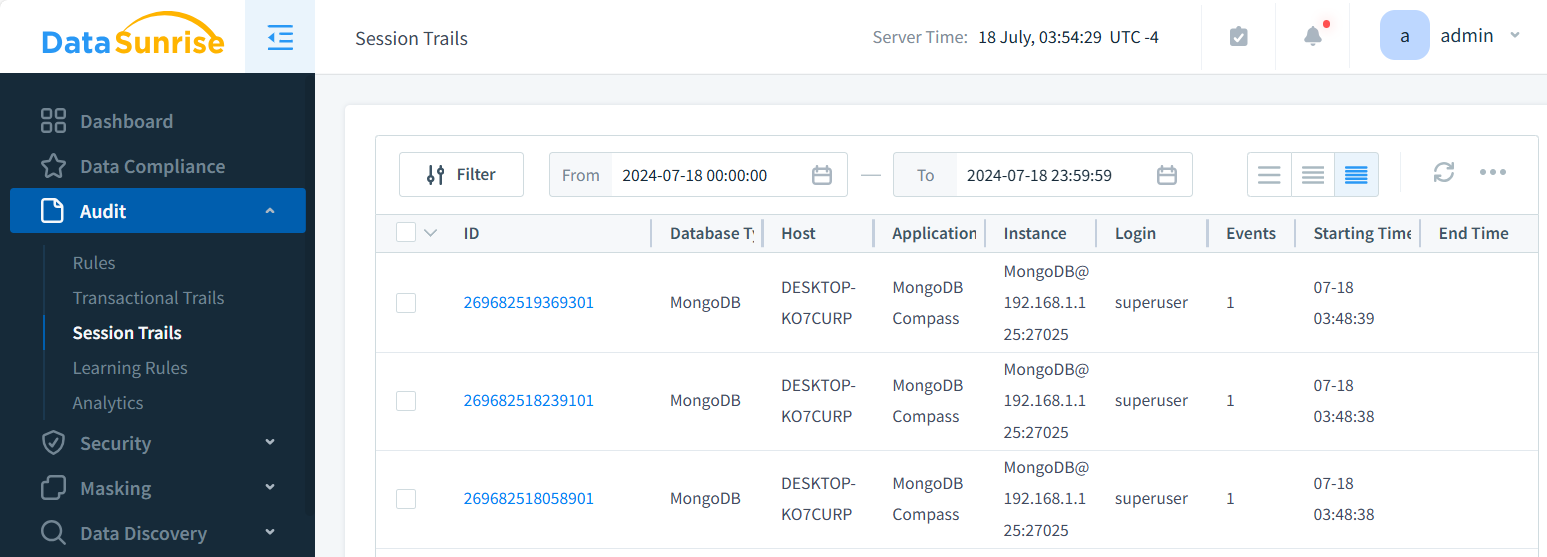
Data Audit for MongoDB

Introduction
The security and integrity of databases are critical, especially for popular NoSQL databases like MongoDB. Over the past decade, news of ransomed exposed databases has become increasingly common. Today, such vulnerabilities account for 65% of attacks on Financial Services. This alarming trend highlights the urgent need for robust data audit for MongoDB environments.
Importantly, most vulnerabilities stem from non-malicious user activities. Timely monitoring and appropriate responses to these actions are essential. Let’s explore how data audits can enhance database security and compliance in MongoDB ecosystems.
What is a Data Audit?
A data audit is a systematic review of database activities and operations. It involves tracking, recording, and analyzing user actions and system events. For MongoDB, this process is crucial in maintaining data integrity, security, and regulatory compliance.
Key Components of MongoDB Auditing
| Component | Description |
|---|---|
| User activity monitoring | Tracks user interactions and queries within the database |
| System event logging | Records system-level events and operations |
| Access control verification | Monitors and validates user access permissions |
| Data modification tracking | Logs changes made to data within the database |
These components work together to create a comprehensive audit trail. This trail is essential for detecting unauthorized access, preventing data breaches, and ensuring compliance with various regulations.
The Importance of Database Activity Monitoring
Database activity monitoring (DAM) is a core aspect of data auditing. It provides real-time insights into database operations. By implementing DAM in MongoDB, organizations can:
- Detect suspicious activities quickly
- Prevent unauthorized data access
- Ensure data integrity
- Facilitate compliance with regulatory requirements
Effective DAM tools offer both real-time alerts and historical analysis capabilities. This dual approach enables proactive threat detection and post-incident forensic investigations.
Compliance and Data Audit for MongoDB
Many industries face strict regulatory requirements regarding data protection and privacy. Data Audit for MongoDB plays a crucial role in meeting these compliance standards. Some key regulations include:
- GDPR (General Data Protection Regulation)
- HIPAA (Health Insurance Portability and Accountability Act)
- PCI DSS (Payment Card Industry Data Security Standard)
By implementing robust audit procedures, organizations can demonstrate their commitment to data protection. This not only helps avoid hefty fines but also builds trust with customers and stakeholders.
Implementing Audit for MongoDB
Enabling Built-in Auditing
MongoDB offers built-in auditing capabilities. To enable auditing:
- Start MongoDB with the –auditDestination parameter
- Configure audit filters to specify which events to capture
- Choose the output format (JSON or BSON)
Third-party Auditing Tools
While MongoDB’s native auditing features are useful, third-party tools can offer enhanced functionality. These tools often provide:
- More granular control over audit policies
- Advanced reporting and visualization
- Integration with security information and event management (SIEM) systems
- Cross-platform database auditing capabilities. Ask chat-bot on our website, which databases are supported.
DataSunrise offers industry-leading audit capabilities for numerous databases and cloud-based warehouses. Its intuitive interface provides comprehensive yet straightforward control over all aspects of database auditing.
The platform seamlessly integrates with Kibana and Elasticsearch, ensuring top-tier real-time monitoring. Additionally, DataSunrise leverages cutting-edge AI tools for in-depth audit trail analysis, enhancing security and compliance efforts.
Setting up MongoDB auditing with DataSunrise is straightforward. Simply create your MongoDB instance and select it in the Audit rule configuration. Then, specify which collections you want to monitor for queries. This streamlined process allows you to quickly implement robust auditing tailored to your specific database needs.

DataSunrise Audit captures queries and session details in both Transactional and Session Trails. Each event is accompanied by a comprehensive description. The integrated Reporting Tool allows you to generate customized reports, providing valuable insights into your MongoDB activity and enhancing your security posture.

Best Practices for MongoDB Auditing
To maximize the effectiveness of your MongoDB audit strategy:
- Define clear audit policies aligned with your security goals
- Regularly review and update audit configurations
- Implement least privilege access controls
- Encrypt audit logs to prevent tampering
- Establish a routine for analyzing audit data
- Train staff on the importance of database auditing
By following these best practices, you can create a robust audit framework that enhances your overall database security posture.
Challenges in Data Audit for MongoDB
While auditing is crucial, it’s not without challenges. Some common issues include:
- Minimal performance impact on database operations, as DataSunrise operates in Sniffer Mode with negligible overhead.
- Storage requirements for audit logs (this is highly customizable in DataSunrise)
- Complexity in analyzing large volumes of audit data
- Balancing comprehensive auditing with privacy concerns
Addressing these challenges requires careful planning and the right tools. It’s essential to strike a balance between thorough auditing and maintaining database performance.
Conclusion
Data auditing is a critical component of MongoDB security and compliance strategies. By implementing robust audit procedures, organizations can protect their data, detect potential threats, and meet regulatory requirements. As data breaches continue to make headlines, the importance of database auditing cannot be overstated.
Remember, effective auditing is not just about collecting data – it’s about deriving actionable insights to improve your overall security posture. Whether you’re using MongoDB’s built-in features or third-party tools, regular auditing should be a cornerstone of your database management practices.
For those seeking comprehensive database security solutions, including advanced auditing capabilities, DataSunrise offers a suite of user-friendly and flexible tools. Our products cover not only auditing but also data masking and discovery, among other essential security features. We invite you to visit the DataSunrise website for an online demo and explore how our solutions can enhance your MongoDB security and compliance efforts.
